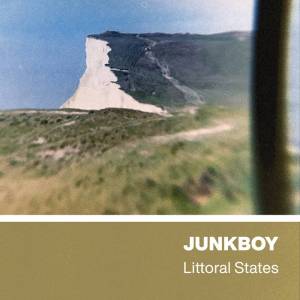 The album’s overall feature is its tone: folkish, pastoral and distinctly British. If the music yields a hint of the 60s, it’s no coincidence: the album was partially inspired by the music of The Beach Boys ~ not their surfing songs, although the album unfolds near the ocean. Littoral States refers to the shore, in this case the Sussex shore, but it can also refer to the passage between states: life and death, sand and sea.
The album’s overall feature is its tone: folkish, pastoral and distinctly British. If the music yields a hint of the 60s, it’s no coincidence: the album was partially inspired by the music of The Beach Boys ~ not their surfing songs, although the album unfolds near the ocean. Littoral States refers to the shore, in this case the Sussex shore, but it can also refer to the passage between states: life and death, sand and sea.
Junkboy (brothers Rich & Mik Hanscomb) lost their father at the beginning of the pandemic, and the creation of this album was part of a healing process. Traveling the coast from west to east, from the town of their father’s birth to one of their current homes, they collected field recordings that now provide the backdrop of the music, then recruited friends to sing and play cello, violin, banjo and trumpet. By the end, the album became more of a celebration than a reflection on loss. Sorrow is as deep as the sea, but the sun shines upon the shore.
The first sound seems like that of a rail car, as if one is embarking or disembarking. The first few seconds after that are tentative, as if settling on a mood; but then the acoustic guitar and cello are joined by banjo, and the comforting journey begins. This is after all the beginning of a life, and so much more awaits.
In “Witch of the Watery Depths,” chimes give way to choral elements, a kind bewitching. Hearing the strings, one recalls the mid-career work of The Beatles, especially the contributions of George Harrison. In the playful “Chase the Knocker,” splashes become percussion, Hannah Lewis sings and a chorus backs her with happy ba-da-das. Warm trumpet launches “Cuckmere River Rises,” and steel guitar continues the charge. When the strings join the party, the mini-orchestra is complete. Backward masking cements the 60s association.
The father loved the coast, and we suspect he would love this music as well, music reminiscent of his own upbringing. When the words “I’m coming” surface in “The Sea Captain,” one thinks of the porous membrane between worlds. “Tidemills Twilight” features speaker separation, a reminder of the time when mono became stereo. A wider sonic world was opened to listeners back then, as it is after birth and again after death. By using the coastline as a metaphor, this loving tribute highlights the fact that matter may change, but it cannot be destroyed. (Richard Allen)
